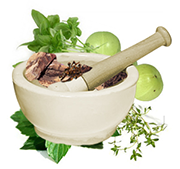The word Ayurveda is derived from two Sanskrit words; Ayus, or "life," and Veda, or "knowledge." "Ayurveda" has been translated as "the knowledge of life," as well as "the science of life." Ayurveda is considered as the oldest healing system prevails in the universe today.

Ayurveda is the traditional Indian medical system, which claims that health, is based on the harmonious relationship between three humours of the body called 'doshas', namely 'Vata', 'Pitta', 'Kapha'. The tridoshas govern all the metabolic activities in an individual; disharmony of these tridoshas leads to various diseases.
The system that has been practiced primarily in the Indian subcontinent for 6,000 years includes diet and herbal remedies and emphasizes the use of body, mind, and spirit in disease prevention and treatment.
Ayurveda addresses all aspects of life- the body, mind and spirit. It is a natural system that advocates preventive and healing therapies by means of purification and rejuvenation. It is a science and an art of appropriate living to achieve longevity.
Ayurveda treats the source of the disease instead of its symptoms; and prescribes medication for prevention and cure. All ayurvedic medicines are derived from plants, herbs and other vegetable sources that do not cause reactions or side effects.
Ayurveda has made significant contribution to the system of healing and rejuvenation.
Origin of Ayurveda
History of Ayurveda starts from the time of the Holy books. Historians have not succeeded in determining the exact period in which Ayurveda came into existence. Most agree that classical Ayurvedic texts were written in India between 3,500 and 5,000 years ago. But the Holy books, Vedas (The ancient Indian Texts of wisdom), suggests an even longer history, as the Rig Veda written over 6,000 years ago had mentioned 60 medicinal preparations that could be used by individuals to overcome various ailments. The medical principles known as Ayurveda are an integral part of Atharva Veda.
Legend
The Indian mythology presents the knowledge of Ayurveda as delivered directly by lord Brahma, the Creator, to the Prajapati Daksha (One of the lords of the animals), he in turn taught Ashwini Kumaras, the heavenly healers. They taught the methods to Indra, the Lord of the Immortals.
When mankind started suffering from various diseases the wise men like Bharadvaja learnt the knowledge of medicine from Indra. Bharadwaja, on his return passed on the lessons to other sages, including Punarvasu Atreya. Atreya taught the system to six of his disciples, who, on the basis of their own understanding of the subject, composed treatises, which became popular and proved helpful in curing various ailments.
Charak and Sushrut –two deciples of Atreya, are the main re-organizers of Ayurveda whose works still exist intact today - The third major treatise is called the Ashtanga Hridaya, which is a concise version of the works of Charak and Sushrut. Thus the three main Ayurvedic texts used today are the Charak Samhita (compilation of the oldest book Atreya Samhita), Sushrut Samhita and the Ashtangha Hridaya Samhita. These books are believed to be over 1,200 years old. Since these texts contain the original and complete knowledge of Ayurvedic medicine, Ayurveda is known today as the only complete medical system that prevails in the world. Other forms of medicine from various cultures have lost much of their original information.
|
|